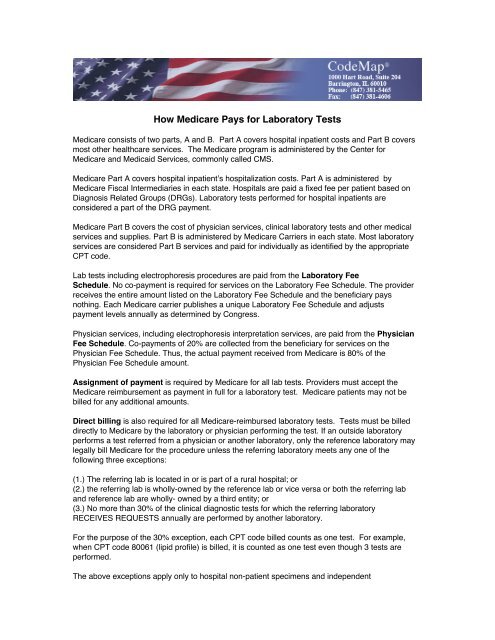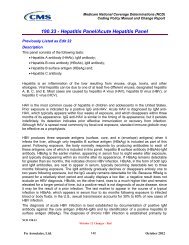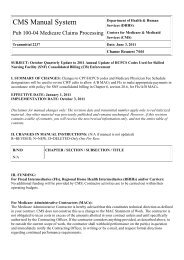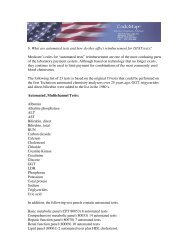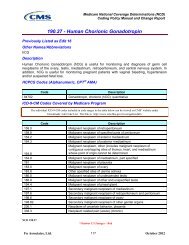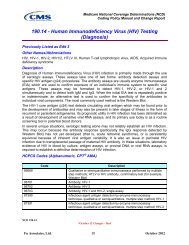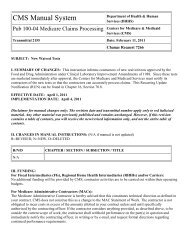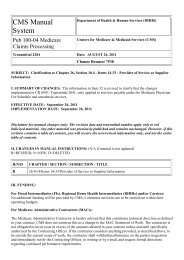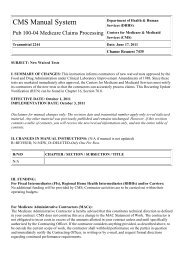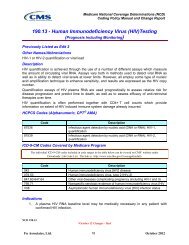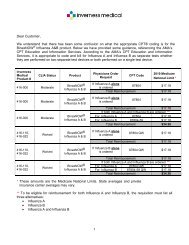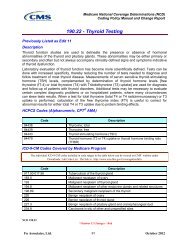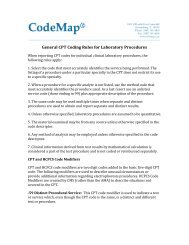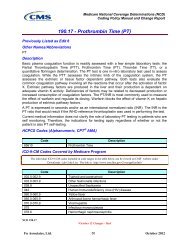How Medicare Pays for Laboratory Tests - CodeMap
How Medicare Pays for Laboratory Tests - CodeMap
How Medicare Pays for Laboratory Tests - CodeMap
You also want an ePaper? Increase the reach of your titles
YUMPU automatically turns print PDFs into web optimized ePapers that Google loves.
<strong>How</strong> <strong>Medicare</strong> <strong>Pays</strong> <strong>for</strong> <strong>Laboratory</strong> <strong>Tests</strong><br />
<strong>Medicare</strong> consists of two parts, A and B. Part A covers hospital inpatient costs and Part B covers<br />
most other healthcare services. The <strong>Medicare</strong> program is administered by the Center <strong>for</strong><br />
<strong>Medicare</strong> and Medicaid Services, commonly called CMS.<br />
<strong>Medicare</strong> Part A covers hospital inpatient’s hospitalization costs. Part A is administered by<br />
<strong>Medicare</strong> Fiscal Intermediaries in each state. Hospitals are paid a fixed fee per patient based on<br />
Diagnosis Related Groups (DRGs). <strong>Laboratory</strong> tests per<strong>for</strong>med <strong>for</strong> hospital inpatients are<br />
considered a part of the DRG payment.<br />
<strong>Medicare</strong> Part B covers the cost of physician services, clinical laboratory tests and other medical<br />
services and supplies. Part B is administered by <strong>Medicare</strong> Carriers in each state. Most laboratory<br />
services are considered Part B services and paid <strong>for</strong> individually as identified by the appropriate<br />
CPT code.<br />
Lab tests including electrophoresis procedures are paid from the <strong>Laboratory</strong> Fee<br />
Schedule. No co-payment is required <strong>for</strong> services on the <strong>Laboratory</strong> Fee Schedule. The provider<br />
receives the entire amount listed on the <strong>Laboratory</strong> Fee Schedule and the beneficiary pays<br />
nothing. Each <strong>Medicare</strong> carrier publishes a unique <strong>Laboratory</strong> Fee Schedule and adjusts<br />
payment levels annually as determined by Congress.<br />
Physician services, including electrophoresis interpretation services, are paid from the Physician<br />
Fee Schedule. Co-payments of 20% are collected from the beneficiary <strong>for</strong> services on the<br />
Physician Fee Schedule. Thus, the actual payment received from <strong>Medicare</strong> is 80% of the<br />
Physician Fee Schedule amount.<br />
Assignment of payment is required by <strong>Medicare</strong> <strong>for</strong> all lab tests. Providers must accept the<br />
<strong>Medicare</strong> reimbursement as payment in full <strong>for</strong> a laboratory test. <strong>Medicare</strong> patients may not be<br />
billed <strong>for</strong> any additional amounts.<br />
Direct billing is also required <strong>for</strong> all <strong>Medicare</strong>-reimbursed laboratory tests. <strong>Tests</strong> must be billed<br />
directly to <strong>Medicare</strong> by the laboratory or physician per<strong>for</strong>ming the test. If an outside laboratory<br />
per<strong>for</strong>ms a test referred from a physician or another laboratory, only the reference laboratory may<br />
legally bill <strong>Medicare</strong> <strong>for</strong> the procedure unless the referring laboratory meets any one of the<br />
following three exceptions:<br />
(1.) The referring lab is located in or is part of a rural hospital; or<br />
(2.) the referring lab is wholly-owned by the reference lab or vice versa or both the referring lab<br />
and reference lab are wholly- owned by a third entity; or<br />
(3.) No more than 30% of the clinical diagnostic tests <strong>for</strong> which the referring laboratory<br />
RECEIVES REQUESTS annually are per<strong>for</strong>med by another laboratory.<br />
For the purpose of the 30% exception, each CPT code billed counts as one test. For example,<br />
when CPT code 80061 (lipid profile) is billed, it is counted as one test even though 3 tests are<br />
per<strong>for</strong>med.<br />
The above exceptions apply only to hospital non-patient specimens and independent
laboratories, not physician laboratories or hospital outpatient specimens. Physicians may not bill<br />
<strong>for</strong> any <strong>Medicare</strong> specimens referred to other labs. Hospital outpatient <strong>Medicare</strong> specimens sent<br />
to reference labs must be billed by the hospital to their <strong>Medicare</strong> Fiscal Intermediary. The hospital<br />
then pays the reference lab <strong>for</strong> per<strong>for</strong>ming the test. Hospital non-patient specimens<br />
(i.e.specimens drawn elsewhere and sent to the hospital <strong>for</strong> testing) may be billed by either the<br />
hospital or the reference laboratory if one of the above exceptions is satisfied.<br />
The following examples illustrate how various providers must bill laboratory procedures to<br />
<strong>Medicare</strong>.<br />
Example 1: A hospital laboratory serves surrounding physicians as a reference<br />
laboratory as well as per<strong>for</strong>ming laboratory tests <strong>for</strong> its own inpatients and outpatients.<br />
<strong>Tests</strong> per<strong>for</strong>med <strong>for</strong> <strong>Medicare</strong> Inpatients are not billed. Payment <strong>for</strong> inpatient lab<br />
services is part of the DRG payment received from the hospital’s Part A Fiscal<br />
Intermediary.<br />
<strong>Tests</strong> per<strong>for</strong>med <strong>for</strong> <strong>Medicare</strong> outpatients must be billed to the hospital’s Part A Fiscal<br />
Intermediary.<br />
<strong>Tests</strong> per<strong>for</strong>med on <strong>Medicare</strong> specimens received from outside physicians (non-patient<br />
specimens) are billed the hospital’s <strong>Medicare</strong> Fiscal Intermediary. Physicians may not bill<br />
<strong>Medicare</strong> <strong>for</strong> such tests.<br />
Example 2: A physician sends a <strong>Medicare</strong> specimen to an independent reference lab <strong>for</strong> protein<br />
electrophoresis.<br />
Only the reference lab may bill <strong>Medicare</strong> <strong>for</strong> the procedure. <strong>How</strong>ever, the physician may bill<br />
private payers <strong>for</strong> reference laboratory services, if the payer does not have a contract with the<br />
reference laboratory preventing such an arrangement.<br />
Example 3: A physician draws a specimen from a <strong>Medicare</strong> patient and per<strong>for</strong>ms a<br />
direct LDL test in his office lab and requests a lipid electrophoresis from an outside reference lab.<br />
The physician must bill his/her <strong>Medicare</strong> Carrier <strong>for</strong> the direct LDL that he per<strong>for</strong>ms.<br />
The reference lab must bill its <strong>Medicare</strong> Carrier <strong>for</strong> the lipid electrophoresis. The bill is always<br />
submitted to the carrier that processes claims <strong>for</strong> the state/area where the laboratory service is<br />
per<strong>for</strong>med, thus two different <strong>Medicare</strong> Carriers might be billed if the reference lab is in a different<br />
state than the physician.<br />
Example 4: A hospital lab per<strong>for</strong>ms a protein electrophoresis <strong>for</strong> a <strong>Medicare</strong> outpatient and a<br />
pathologist provides an interpretation (as requested by the referring physician).<br />
The hospital must bill its Fiscal Intermediary <strong>for</strong> the lab procedure.<br />
The pathologist must bill his/her <strong>Medicare</strong> Carrier <strong>for</strong> the interpretation.<br />
Example 5: An independent reference laboratory per<strong>for</strong>ms a protein electrophoresis and<br />
interpretation by their pathologist <strong>for</strong> a <strong>Medicare</strong> patient as requested by a referring physician.<br />
The laboratory bills its <strong>Medicare</strong> Carrier <strong>for</strong> both the lab procedure and the interpretation.
<strong>Medicare</strong> Medical Necessity Requirements<br />
For <strong>Medicare</strong> to pay <strong>for</strong> any laboratory test, the test must be medically reasonable and necessity.<br />
Diagnosis codes or narrative descriptions are used to document the medical necessity <strong>for</strong> tests<br />
per<strong>for</strong>med. Carriers can establish Local Coverage Determinations (LCDs) when they identify<br />
over-utilization or aberrant billing patterns <strong>for</strong> a particular test. These policies specify when<br />
<strong>Medicare</strong> covers a given CPT code and usually contain a list of covered ICD-9 (Diagnosis) codes.<br />
Claims with non-covered diagnosis codes are denied as medically unnecessary. National<br />
Coverage Determinations (NCDs) are also used to define the medical necessity of laboratory<br />
tests. The only NCD applicable to electrophoretic assays is <strong>for</strong> lipids. See Lipids NCD.<br />
Billing Patients <strong>for</strong> Denied <strong>Medicare</strong> Services<br />
<strong>Medicare</strong> patients may be billed <strong>for</strong> services that are clearly not covered. For example, routine<br />
physicals or screening tests when there is no indication that the test is medically necessary.<br />
<strong>How</strong>ever, when a <strong>Medicare</strong> carrier is likely to deny payment because of medical necessity policy<br />
(either as stated in LMRP, NCD or upon examination of individual claims) the provider may not<br />
bill the patient unless the patient has been in<strong>for</strong>med of their potential liability. If the provider fails<br />
to in<strong>for</strong>m the patient of the liability be<strong>for</strong>e per<strong>for</strong>ming the test, the patient has no obligation to pay.<br />
An Advance Beneficiary Notice or ABN is used to document that the patient knows that <strong>Medicare</strong><br />
may not pay <strong>for</strong> a test and has agreed to pay the provider in the event payment is denied. Each<br />
ABN must be specific to the service provided and the reason that <strong>Medicare</strong> may not pay <strong>for</strong> the<br />
service. Blanket waivers <strong>for</strong> all <strong>Medicare</strong> patients are not allowed. If <strong>Medicare</strong> pays <strong>for</strong> the test,<br />
the physician must accept the fee schedule payment as full reimbursement. If <strong>Medicare</strong> denies<br />
payment, the physician can bill the patient <strong>for</strong> the test at his usual and customary rate and the<br />
patient is obligated to pay.<br />
The CPT code modifier, -GA (Waiver of Liability Statement on file), is used to indicate that a<br />
provider has notified the <strong>Medicare</strong> patient that the test per<strong>for</strong>med may not be reimbursed by<br />
<strong>Medicare</strong> and may be billed to the patient.<br />
Standard CMS ABN <strong>for</strong>ms must be used. CMS <strong>for</strong>m No. CMS-R-131-L is specific <strong>for</strong> laboratory<br />
use. CMS <strong>for</strong>m No. CMS-R-131-G is <strong>for</strong> general use. These <strong>for</strong>ms are available on the CMS<br />
website at www.cms.hhs.gov/medicare/bni. The <strong>for</strong>ms may be printed on the back of laboratory<br />
requisitions, but may not be otherwise modified except <strong>for</strong> the customizable boxes.


